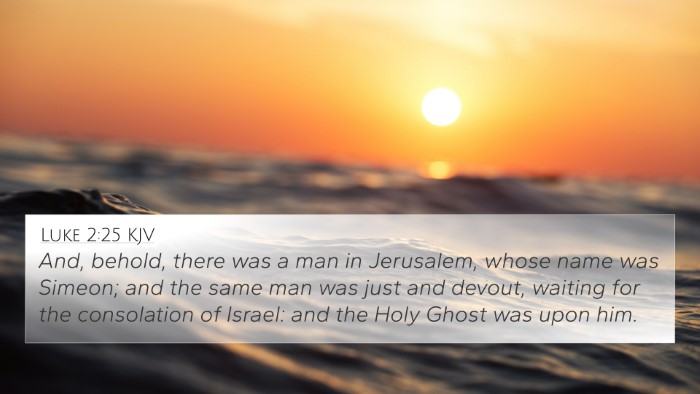Psalms 39:7 - Understanding the Verse
Bible Verse: Psalms 39:7
Verse Text: "And now, O Lord, for what do I wait? My hope is in You."
Summary of Insights
This verse from Psalms reflects the psalmist's deep spiritual introspection regarding the purpose of life and the ultimate source of hope. In the face of life's transience and the struggle with mortality, the psalmist turns to God, recognizing that true hope is anchored not in worldly desires but in divine assurance.
Commentary Insights
- Matthew Henry: Henry emphasizes the futility of human pursuits when detached from God. He notes that the psalmist, after reflecting on life's brevity, clarifies that his wait and expectation rely solely on the Lord. This acknowledgment serves as a reminder to redirect our hopes toward God rather than transient worldly pleasures.
- Albert Barnes: Barnes discusses the context of waiting, suggesting that the psalmist's query about waiting signifies a contemplative state. The expectation of the Lord denotes a heart of faith that finds peace and assurance in divine providence, regardless of immediate circumstances.
- Adam Clarke: Clarke outlines the importance of hope in God, viewing it as a powerful motivator and sustainer of believers. He interprets the phrase 'for what do I wait?' as a profound realization that only God can fulfill the deepest longings of the heart, contrasting hope in God with the emptiness of earthly aspirations.
Thematic Connections and Cross-References
To fully appreciate Psalms 39:7, it can be beneficial to explore various Bible verses that parallel and support its message. Below are some related scriptures that reinforce the themes of hope, faith, and reliance on God:
- Psalms 62:5: "My soul, wait only upon God; for my expectation is from him."
- Isaiah 40:31: "But they that wait upon the Lord shall renew their strength; they shall mount up with wings as eagles; they shall run, and not be weary; and they shall walk, and not faint."
- Romans 8:24-25: "For we are saved by hope: but hope that is seen is not hope: for what a man seeth, why doth he yet hope for? But if we hope for that we see not, then do we with patience wait for it."
- Hebrews 6:19: "Which hope we have as an anchor of the soul, both sure and steadfast..."
- Proverbs 13:12: "Hope deferred maketh the heart sick: but when the desire cometh, it is a tree of life."
- 1 Peter 1:13: "Wherefore gird up the loins of your mind, be sober, and hope to the end for the grace that is to be brought unto you at the revelation of Jesus Christ."
- Lamentations 3:24: "The Lord is my portion, saith my soul; therefore will I hope in him."
Importance of Cross-Referencing in Bible Study
Understanding Psalms 39:7 along with its cross-references enhances the depth of study through:
- Thematic Bible verse connections: Making connections enables a fuller understanding of Scriptural themes such as hope and reliance on God.
- Comparative Bible verse analysis: By contrasting different scriptures, one can observe diverse facets of faith and expectation.
- Cross-referencing Biblical texts: This practice aids in building a rich tapestry of related teachings, reinforcing the believer's faith journey.
Tools and Methods for Bible Cross-Referencing
To effectively utilize the insights gained from cross-referenced scriptures, consider using various Bible study resources:
- Bible concordance: A valuable tool for locating related verses and themes throughout the Bible.
- Cross-reference Bible study guides: These often include comprehensive charts and notes to assist with thematic studies.
- Bible reference resources: Digital tools and apps that facilitate quick access to cross-referenced verses and topics.
- Bible chain references: A method where related verses are linked together, providing an organized approach to study.
Conclusion
Psalms 39:7 serves as a poignant reminder that true hope lies in God alone. By engaging with this verse through cross-references and thoughtful commentary, believers can reinforce their faith and cultivate a deeper understanding of their relationship with God. Incorporating these practices in your Bible studies can lead to more profound insights and a stronger spiritual foundation.










